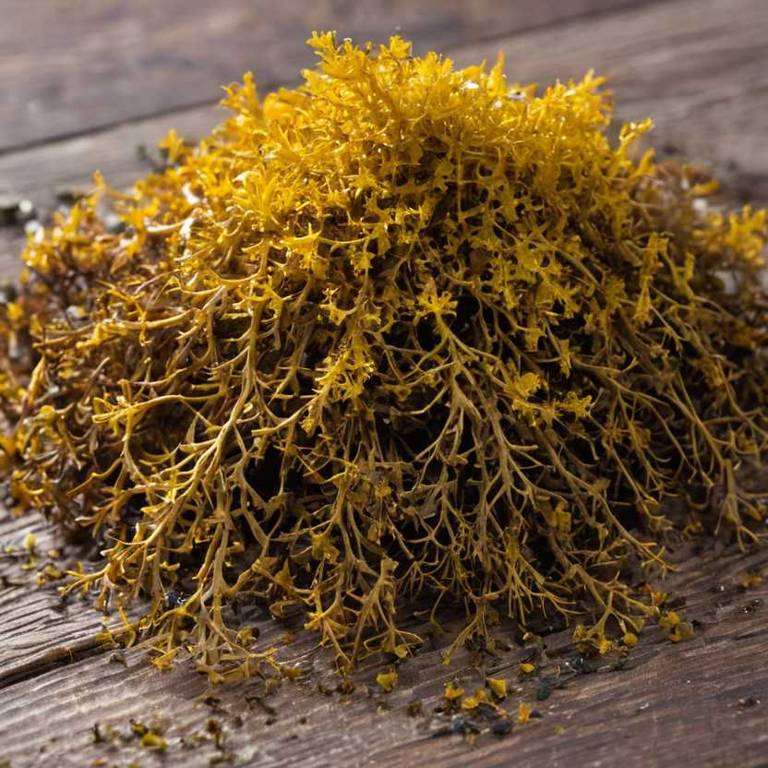10 Best Sargassum Fusiforme Preparations

The best medicinal preparations of Sargassum fusiforme are teas, decoctions, tinctures, capsules, and creams, each offering unique benefits for health and wellness.
Teas made from the dried seaweed are commonly used to support thyroid function and digestion.
Decoctions involve simmering the herb to extract its active compounds, enhancing its potency for internal use.
Tinctures provide a concentrated form, ideal for quick absorption and targeted therapeutic effects.
Capsules offer a convenient and standardized method for daily supplementation, while creams are applied topically to treat skin conditions and inflammation.
Below there's a list of the 10 best herbal preparations of sargassum fusiforme for medicinal purposes.
1. Teas
Sargassum fusiforme teas is commonly used to support digestive health, reduce inflammation, and treat skin conditions.
This herbal preparation is often utilized for ailments such as indigestion, gastritis, and eczema due to its soothing and detoxifying properties. The most common medicinal uses include alleviating gastrointestinal discomfort, promoting liver function, and managing mild inflammatory conditions. The bioactive constituents responsible for these effects include polysaccharides, alginates, and various minerals like iodine, which contribute to its anti-inflammatory and antioxidant properties.
Additionally, the presence of phenolic compounds and fucoidans enhances its therapeutic potential.

2. Decoctions
Sargassum fusiforme decoctions is commonly used to treat a variety of ailments including inflammation, respiratory disorders, and skin conditions.
These decoctions are traditionally employed in traditional medicine systems to alleviate symptoms of asthma, bronchitis, and eczema. The bioactive constituents responsible for its medicinal properties include polysaccharides, phenolic compounds, and minerals such as iodine and potassium. These compounds exhibit antioxidant, anti-inflammatory, and immunomodulatory effects.
Additionally, the decoctions may support thyroid function due to their high iodine content.

3. Tinctures
Sargassum fusiforme tinctures is commonly used to treat respiratory conditions, skin disorders, and inflammation due to its potent bioactive compounds.
These tinctures are often employed for alleviating symptoms of asthma, bronchitis, and eczema, as well as for reducing swelling and pain associated with arthritis. The medicinal properties of Sargassum fusiforme tinctures are attributed to compounds such as fucoidan, alginic acid, and various polysaccharides that exhibit anti-inflammatory, antioxidant, and immunomodulatory effects. Additionally, the presence of minerals like iodine and trace elements contributes to its therapeutic value.
These bioactive constituents work synergistically to support the body's natural healing processes and enhance immune function.

4. Capsules
Sargassum fusiforme capsules is commonly used to support thyroid health, reduce inflammation, and promote detoxification.
These capsules are frequently employed to treat conditions such as hypothyroidism, thyroid nodules, and digestive disorders. The bioactive constituents responsible for these effects include iodine, fucoidan, alginic acid, and various minerals like potassium and magnesium. Additionally, the presence of antioxidants and polysaccharides contributes to its anti-inflammatory and immune-supporting properties.
This herbal preparation is also believed to aid in weight management and skin health due to its rich nutrient profile.

5. Creams
Sargassum fusiforme creams is commonly used to treat skin conditions and inflammatory disorders.
These creams are often applied for their anti-inflammatory, antimicrobial, and wound-healing properties. They are frequently used to alleviate symptoms of eczema, psoriasis, and fungal infections. The bioactive constituents include polysaccharides, fucoidans, and various minerals that contribute to their therapeutic effects.
These compounds help reduce inflammation, enhance skin regeneration, and provide antioxidant protection.

6. Juices
Sargassum fusiforme juices is commonly used to treat inflammation, digestive disorders, and skin conditions.
It is widely utilized in traditional medicine for its anti-inflammatory, antimicrobial, and antioxidant properties. The most common ailments treated with this preparation include gastrointestinal issues like gastritis and ulcers, as well as skin infections and inflammatory diseases. The bioactive constituents responsible for its medicinal effects include polysaccharides, fucoidans, minerals, and various phytochemicals such as sulfated compounds and phenolic acids.
These components contribute to its ability to modulate immune responses and protect against oxidative stress.

7. Mucillages
Sargassum fusiforme mucillages is commonly used to treat digestive disorders, inflammation, and skin conditions due to its soothing and healing properties.
The most common medicinal uses include alleviating symptoms of gastritis, ulcers, and inflammatory bowel diseases, as well as promoting wound healing and reducing skin irritation. The bioactive constituents responsible for these effects include polysaccharides, fucoidan, minerals, and amino acids, which exhibit anti-inflammatory, antioxidant, and immunomodulatory activities. These compounds help in reducing oxidative stress and supporting the body's natural healing processes.
Additionally, the mucillages may aid in detoxification and improve gut health by promoting the growth of beneficial bacteria.

9. Oils
Sargassum fusiforme oils is commonly used to treat skin conditions, inflammation, and respiratory issues due to its anti-inflammatory and antimicrobial properties.
The most common medicinal uses include alleviating symptoms of eczema, psoriasis, and asthma, as well as reducing swelling and pain associated with arthritis. The bioactive constituents responsible for these effects include fucoidan, sulfated polysaccharides, and various phenolic compounds, which exhibit antioxidant, anti-inflammatory, and immunomodulatory activities. These compounds help in reducing oxidative stress and modulating immune responses.
Additionally, the oils may support digestive health by promoting the secretion of digestive enzymes.

10. Poultices
Sargassum fusiforme poultices is commonly used to treat skin conditions, inflammation, and infections due to their anti-inflammatory and antimicrobial properties.
These poultices are often applied externally to reduce swelling, soothe rashes, and promote wound healing. The most common medicinal uses include treating eczema, boils, and other dermatological issues, as well as alleviating symptoms of arthritis and muscle pain. The bioactive constituents responsible for these effects include polysaccharides, fucoidans, and various minerals such as iodine and magnesium.
These compounds contribute to the plant's ability to modulate immune responses and exhibit antioxidant and anti-inflammatory activities.
